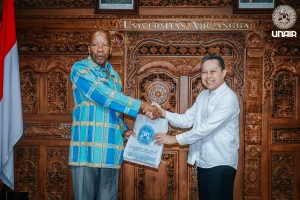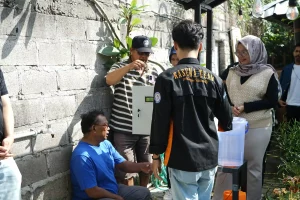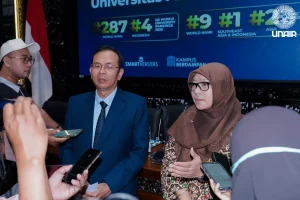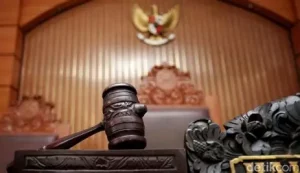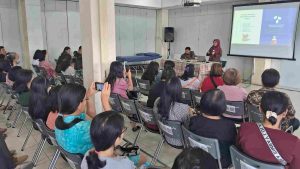UNAIR NEWS – A series of events on Bradanaya activities at Faculty of Humanities at Universitas Airlangga focuses on preventing radicalism. One of the efforts is in form of a critical discussion about Pancasila ideology to 2018 FIB UNAIR freshmen, especially aimed at strengthening ideology of Pancasila.
Being held in Prapanca Room FIB UNAIR on Thursday, August 9, Balayudha, FIB Bradanaya’s disciplinary team themed “Violent Terrorism Deradicalization”. Balayudha, the coordinator of the discussion, invited freshmen to be critical of each other about big themes with various points of view.
In his presentation, the Coordinator of Balayudha Ridho Permana explained that the radical concept could be resisted with an understanding of nationalism, by explaining the history and meaning of Pancasila.
According to Ridho, the origin of Pancasila already existed during Majapahit kingdom. The form is Bhineka Tunggal Ika. The word in the Sutasoma Book as a symbol of unifying the diversity of the archipelago in the past.
” Bhineka Tunggal Ika (Unity in Diversity) is the main basic stage. This is the initial idea of Pancasila, then in the period leading up to independence, precisely on 29 May to 1 June 1945, the founding fathers (founders of the nation) made Pancasila, ” he said.
Understanding Pancasila
According to Ridho, in understanding Pancasila as the foundation of Indonesian State, the first thing to understand is religion, the concept of Godness. Religions bring tolerance. Therefore, that sense of tolerance will form a sense of humanity.
Then, if a sense of humanity has been formed, a sense of unity will emerge. A nation led by a wise leader, there is a word of consensus in the democratic process.
“And if divinity is achieved, humanity, unity, and consensus representation, there will be a value of justice for all the people of Indonesia,” said the student of History of FIB UNAIR.
The explanation about Pancasila was an effective form to counter radicalism. The values of Pancasila are very important to be instilled to freshmen so they will not be affected by the wrong ideology.
In the question and answer session, one of Reza’s participants stated that the misunderstanding of religious values can also be an impact on the cause of radicalism. According to him, there are adverse effects of radicalism that have been seen in the community lately.
The Head of Student Affairs of FIB UNAIR Bayu responded to the critical discussion as a way to see the basis and intention of growing radicalism. It is important, he continued, to find out the motivation of someone acting radically.
“For me, we need to look beyond how radicalism is formed. Things done by students (committee, ed) are good, especially introducing them regarding the dangers of radicalism, “he said. (*)
Author: Fariz Ilham Rosyidi
Editor: Feri Fenoria Rifa’i



